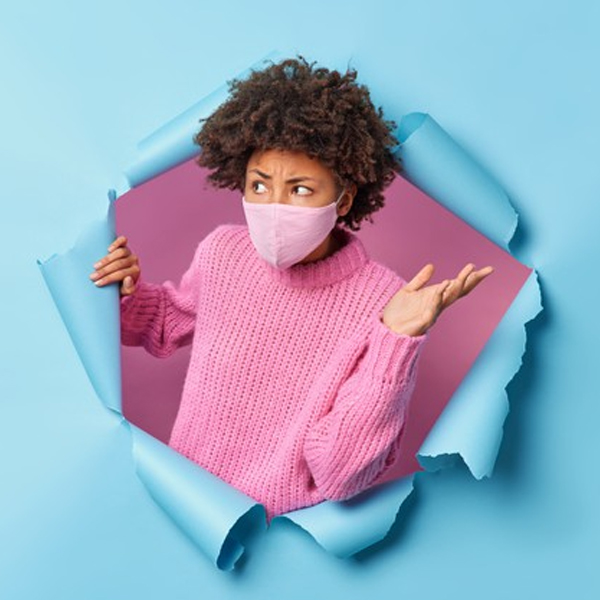
What are chances of Reinfection of COVID 19 in India ?
COVID 19 Re-Infection Rate in India
COVID 19 Re-Infection rates among fully vaccinated healthcare professionals are relatively low, ranging between 5 and 6 percent.
One thing to keep in mind is that none of them required special attention. Due to comorbidities, a few of them were on ventilators. As a result, if the general population, who is not exposed to the virus daily, the chances of reinfection are extremely low.
It is critical to understand the distinction between relapse and reinfection, how frequently it occurs, and what precautions people should take when out in public. This contributes to better treatment techniques and a better knowledge of the new Coronavirus.
According to experts, this is no cause for alarm, and reinfection is extremely unlikely. From a layperson's perspective, it is critical to understand the testing procedure and its limits, as well as to minimize stress related to COVID-19 reinfection.
One potential stumbling block is the test itself. The RT/PCR test, which is performed in conjunction with the swab, reveals Coronavirus infection in 70% of the patients. However, 30% of the instances are likely to be false negatives.
Another significant difficulty is that the test cannot distinguish between living and dead viruses. As a result, what is viewed as reinfection might be dead virus particles present in recovered individuals, resulting in False Positives.
How long do the antibodies stay in your system after a Coronavirus infection?
Our immune system, like our own memory, recalls some infections quite well but forgets about others. For example, the MMR vaccination, which is used to prevent measles, offers life-long protection against the disease. Some flu vaccinations, however, require an annual dosage since the antibodies only persist for a limited time in the immune system.
Coronavirus has not been around long enough to determine how long antibodies against it will stay, thus it is still unknown if the vaccinations will give life-long immunity.
Other human Coronaviruses provide information on how long the targeted antibodies survive in the human body. Four kinds of Coronaviruses that cause the common cold create short-lived immunity that lasts less than a year. COVID-19 re-infection, on the other hand, is typically milder once infected, as is to be expected with COVID-19.
Have individuals been re-infected with COVID-19 twice?
Until recently, several cases of COVID-19 re-infection have been documented. However, they were seen as mistakes, with patients being informed incorrectly that they were rid of the virus after infection. In other words, disease relapse was misdiagnosed as re-infection.
Re-infection, while not impossible, is extremely unlikely, according to experts. Furthermore, a single example cannot be deemed as definitive research. Experiments on Rhesus monkeys reveal that when they were re-infected with the Coronavirus that causes COVID-19 three weeks later, they did not exhibit any symptoms.
How long should one wait to get vaccinated, if they are infected with covid infection?
Simply, one should follow a rule of “one, two, and three.”
● Covaxin , Sputnik and other vaccine: 1 month
● Covishield: 2-3 months
● Infected with covid before, after, or between doses: 3 months.
The Bottom line
Immunity protects you from sickness and minimizes the virus's impact on your body. Understanding who is in danger of contracting and transmitting the virus is critical for easing lockdown rules. The length of immunity gained by infection or vaccination determines how well the virus can be controlled. The length of time the antibodies and protection to the virus endure will also determine whether the vaccination is effective for life or requires yearly injections.
Reference:
1. https://www.narayanahealth.org/blog/can-you-get-reinfected-by-covid19/
Related FAQs
Everything You need to know about Outbreak of Novel Corona virus Infection in china
Coronavirus in India: Symptoms, Cases and Latest Updates
WHO declares Global Health Emergency -India’s first case of Coronavirus in Kerala
WHO Declares The Outbreak Of The Coronavirus As A Pandemic
COVID-19 or Coronavirus Declared as A Pandemic
Difference between Quarantine, Isolation and Social Distancing
101 With Hantavirus: Causes, Symptoms And Treatment
India Under Quarantine: Can It Block The Virus Progress?
British Prime Minister Boris Johnson Diagnosed with COVID 19
Can Coronavirus Risk Increase In Diabetic Patient
Diabetes and Coronavirus (COVID-19)
Coronavirus-Diabetics are more vulnerable By Dr. Manoj Chawla
Prevention from Coronavirus Infections
Coronavirus- Telemedicine for Diabetes patients
Coronavirus: Is India In Stage 3?
Should I Get Tested For Coronavirus?
COVID-19: The Impact On Human Immune System
COVID-19 in heart and Blood Pressure patient
COVID-19- Update for Heart and Blood Pressure patient
Coronavirus Pandemic: Current situation
Coronavirus And Skin Problems: Things You Must Know
COVID 19 And Kidney: Everything You Should Know
Corona Lockdown Extended To 3rd May 2020: Know Why
Covid-19: How To Stay Safe If You Have Diabetes
All That You Should Know About COVID-19 Or Coronavirus
Diabetes And Covid-19: Keep Calm And Stay Safe
Covid-19 Impact On Diabetes Patients: Things To Keep In Mind
Telemedicine: The Safest Mode Of Doctor-Patient Interaction During Covid-19
Everything you need to know about Russian Sputnik V Vaccine
Know the Difference Between Viral Fever and Coronavirus
New 'Double Mutant' Strain Of Covid-19 Detected In India
Will India See A Third Wave Of COVID -19?
Why is COVID Vaccination Important in India?
What are chances of Reinfection of COVID 19 in India ?
Are Children at Risk of Omicron?
Corona- Delta and Delta Plus Variants
Everything To Know About The Omicron Variant
Symptoms and Severity of Omicron: BA.4 and BA.5 | Medtalks
Another Milestone Reached: US Successfully Developers Covid Vaccine For Babies and Toddlers
Indian researchers find a new way to combat Covid-19
Covid-19 Infection Provides Protection against Reinfection for Roughly 10 Months
